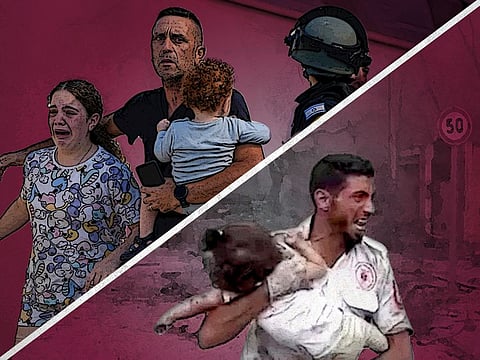Why Israel-Gaza war is a dangerous game of fake news
As the conflict intensifies, so does the deluge of misinformation on social media

As the Israeli-Palestinian conflict intensifies, so does the deluge of misinformation flooding our social media feeds.
Faced with this surge of fake content on X (formerly Twitter) and other platforms, influenced by Hamas’s shocking attacks on Israel, there are now calls for immediate action from social media giants, with the European Union calling on none other than Elon Musk, owner of X, to tackle disinformation.
The battleground, it appears, has shifted from the war-torn streets to the digital realm, and the consequences are dire.
Since Hamas launched its ferocious attacks from Gaza, social media platforms have become inundated with a tsunami of videos and photos purporting to depict the conflict.
Unfortunately, a significant portion of this content is fabricated, aimed at swaying public opinion in the fog of war.
Disinformation and falsity
False claims of the kidnapping of an Israeli commander, purported beheading of toddlers, a doctored White House memo supposedly announcing substantial aid for Israel, and old unrelated videos of Russian President Vladimir Putin with misleading English captions have flooded the internet. There is so much fake news that it actually veers into mind-boggling.
In the wake of Hamas’s attack, X, among other major social media platforms, were quickly awash with tremendous amount of disinformation and falsity.
Community Note, a feature on X meant to provide context — for instance — correctly identified individuals in a video as Israeli law enforcement, not Hamas. The clip in question mislabelled gunmen standing next to Israeli citizens.
However, the video remains online, amassing millions of impressions, shared even by X accounts with verified checkmarks.
Spread of misinformation
Disinformation, the deliberate spread of fake news, has been rife on other social networks like Facebook, Instagram, and TikTok for years.
Still, it seems Musk’s revamped policies and substantial layoffs in X’s Trust and Safety teams have made the platform particularly susceptible to the spread of misinformation.
While X, Meta (which owns Facebook, Instagram, and Threads), TikTok, and BlueSky have remained silent on the matter, X has reported over 50 million posts about the conflict on its platform over the last few days.
Their response included the removal of fake accounts, the escalation of tens of thousands of posts for sharing graphic media and hate speech, and updates to policies that define what is considered “newsworthy.”
Heat of the moment
The fact remains that these tech giants are struggling to curb the proliferation of disinformation even as it runs rampant.
They provide statistics on posts removed and accounts blocked but avoid addressing the metrics of their failures.
The problem is that misinformation continues to spread amid the ongoing conflict, highlighting the urgent need for better regulation.
As the violence claims lives on both sides in the Israel-Gaza conflict, social media has a dangerous role in shaping public perception.
During times of conflict, it’s commonplace for some users — in the heat of the moment — to share misleading content, miscaptioned images, or manipulated documents to mold public opinion.
Misleading viral content
The cost of this digital war is high, and it’s time for social media companies to be held accountable.
In the chaos of a war zone, we expect disinformation on the ground. However, we must not tolerate it in our digital spaces — where we now get most of the information from.
Misleading viral content, such as a video game being mistaken for real warfare, is not just misleading; it’s dangerous.
While the conflict rages on, the battle against the barrage of deception on social media is one we cannot afford to lose. It’s a war of information, and the first casualties are truth and public trust.
Sign up for the Daily Briefing
Get the latest news and updates straight to your inbox






